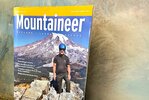

When people dream of retirement plans, they often see themselves relaxing on a secluded beach or in a rustic cabin tucked away in the mountains.
For Centralia resident Neal Kirby, 71, beaches aren’t his thing, and he prefers to be summiting those mountains instead.
From Mount Rainier in his own backyard to Mount Kilimanjaro in Tanzania, Kirby has traveled the world, indulging a love for the outdoors he’s had since he was a child. He’s summited Rainier several times, including most recently on June 30.
“I’ve climbed Rainier seven times since I qualified for Social Security, and I climbed Mount Baker again this year, too,” Kirby said.
As a retired principal in the Centralia School District and former school board director, Kirby has dived into the world of climbing since stepping away from the world of a 9-to-5 job.
Last year, he climbed Glacier Peak, completing his effort to reach the summit of all five of Washington’s volcanoes in one summer.
While his adventures have been chronicled in this newspaper on several occasions, he recently garnered a larger audience. Kirby was featured on the cover of the summer edition of Mountaineer magazine. He’s pictured standing on a ridge with Mount Rainier dominating the horizon behind him and the headline “Summiting at 70.”
Kirby sat down with The Chronicle to discuss climbing, the role alcoholism and sobriety have played in his life and what his future plans are.
Growing up, Kirby's father was a career U.S. Navy sailor, so his family moved around a lot when he was young. When his father finally retired, the family settled in Whidbey Island, where Kirby graduated from Oak Harbor High School.
After learning to ski at Stevens Pass during high school, his grandmother took him on a road trip to Utah’s national parks, which cemented his desire to be immersed in nature.
“There were eight kids in our family. I used to piss off my dad complaining and saying, ‘Why aren’t we going camping more?’ But now I think back, and with eight kids, how the hell would they have done it?” Kirby said.
He eventually got married and began a career as a teacher, but after a few run-ins with the law and struggles with alcoholism, he finally began treatment after being given an ultimatum from a judge.
Throughout his life, he’s continued to maintain a community with other alcoholics.
“Having a good community of other alcoholics for support is essential … It's good to have other people who understand the insanity of alcoholism,” Kirby said.
With a good support system in place, those struggling with alcoholism can overcome it, he said.
Sober for almost 40 years now, he helps lead mountaineering expeditions with One Step At a Time (OSAT), an organization that takes people who have never climbed before and are in recovery programs and teaches them how to summit mountains among other outdoor activities.
The stigma of alcoholism is something he still feels is an issue as well.
“It’s the difference of, do you view alcoholism as a sickness or do you view it as a matter of character and willpower? I had a superintendent who saw it as a character and willpower issue. He used to ask me, ‘you can’t just have one beer?’” Kirby said.
He said the superintendent cost him a job in a nearby school district because of these beliefs, even after Kirby had been sober for 16 years. Climbing mountains is a metaphor for life in Kirby’s opinion, and despite setbacks like this, he said he keeps moving forward.
He’s been tested by the elements while climbing. During a summit of Mount Rainier in 2014, the guide he was with led his group straight into a blizzard.
“The guide was fairly new at leading, and he wanted to make the summit hell or high water, snowstorms or blizzards,” Kirby said. “He did have to talk a lot with guide leadership after as to why he kept us going.”
Normally, climbing groups and guides stop at Camp Muir, where park rangers will visit daily to provide weather forecasts and warn of possible crevices for those preparing to summit.
“If you go 1,000 feet higher and camp at Ingraham Flats, you don’t get that, and the last report we got was it’s gonna be blue-bird weather, so off we went. You always start late at night when the snow is hard and frozen so your crampons can grip really well,” Kirby said. “We started at about 11 o’clock at night, and by about two in the morning, it just started snowing and coming down heavy.”
Despite the storm, they were able to reach the summit using their GPS systems. The storm hit in the middle of July, which is rare. It’s all just part of the unpredictability that comes with summiting mountains, Kirby added.
Alpine climbing is always a risky endeavor, but it doesn’t stop Kirby. While he is still planning future alpine summits, he is now focusing on longer backpacking hikes as well.
“There’s an incredible amount of pretty places here that you don’t have to go up to the tops of mountains to enjoy them. I just went up to Royal Basin for three days last week, and it was just gorgeous,” Kirby said.
To read the article about Kirby in Mountaineer magazine, visit https://issuu.com/dougc/docs/mtrvol117no2_summer23_web/s/25607247.
For more information on OSAT, including how to get involved, visit https://www.osat.org/.